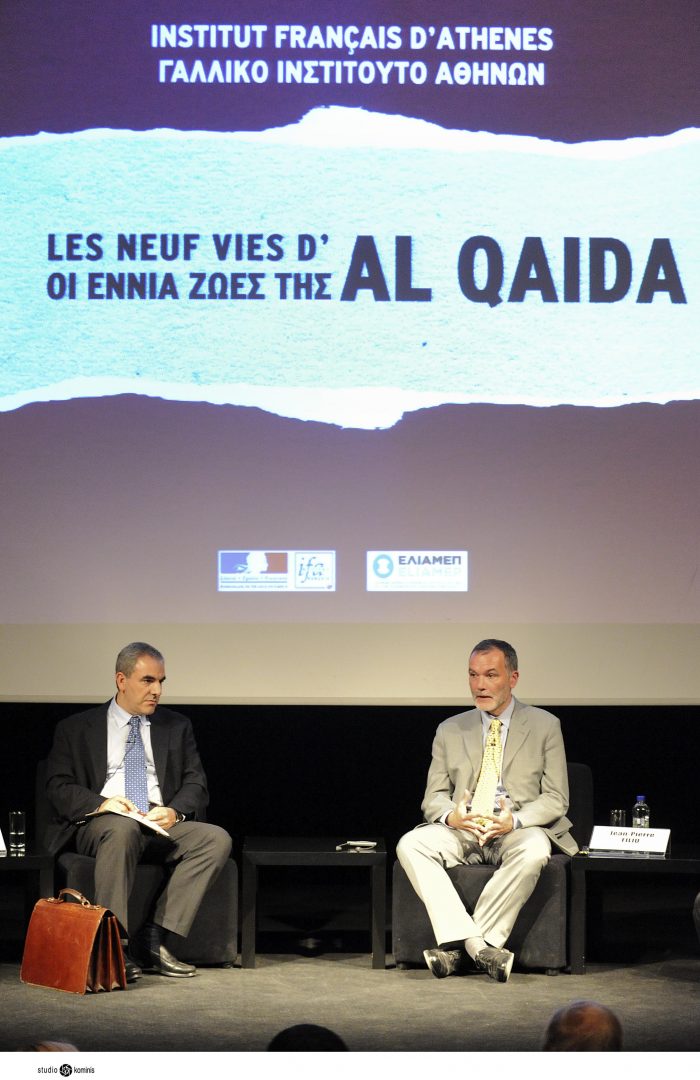
The Hellenic Foundation for European and Foreign Policy (ELIAMEP) and the French Institute of Athens organized a lecture by Jean-Pierre Filiu, former French diplomat, now a professor at Sciences-Po Paris, on his most recent book which looks at the future of Al-Qaida: The Nine Lives of Al-Qaida (in French “Les Neuf Vies d’ Al-Qaida”¬, Librairie Arthème Fayard, 2008). The event took place at the French Institute of Athens (Auditorium) on May 19, 2010 and Dr. Thanos Dokos, General Director of ELIAMEP, moderated the discussion. Jean-Pierre Filiu began his talk by explaining that after 21 years of re-adaptations, Al-Qaida (AQ) is still today the only worldwide terror network. However, according to Filiu, this cycle of regenerations is about to come to an end. Years of research have shown that AQ is losing ground and there is an obvious degradation of its operational capability.
A number of missed opportunities for AQ, its rigid character on the field of ideology, as well as the necessary constant movement are now its greatest weaknesses. Its capacity to recruit members has long relied on the message that all Muslims should participate in the jihad against the West. This capacity no longer exists due to the fact that the vast majority of the casualties of AQ are Muslims, not Westerners. The war that Bin Laden talks about constantly is the one in Pakistan, where the bulk of AQ forces are being kept now. That is the whole paradox of this war in a country where the Americans are not present on the ground. This status, Filiu stated, has greatly diminished its influence over the Muslim World in the Middle East.
His central argument is that the 9/11 was at the same time the sign of ascendancy and decline for Al-Qaida. Filiu observed that from that moment, a feeling of disgust began to spread throughout the Arab World and gradually weakened the type of Jihad that AQ created, the global Jihad. The American elections in 2008 and the victory of Obama was a crucial moment for the history of AQ, as the things didn’t turn out well for the Jihadists. As AQ was in favor of the war in Iraq, the idea that a Democrat, Afro-American and opponent of the invasion could win the elections seemed impossible to them. The key of Obama’s speech in Cairo was to describe AQ as a common threat to Islam and the West and not only to the West.
The AQ itself, after its rejection by the tribes in Iraq, is trying to regroup in Pakistan, by cooperating with the Taliban. As a last resort, the jihadi network has recently established a franchise in the Islamic Maghreb and also shifted a large part of its activities south to the Sahara desert and Yemen. Today, AQ is fighting for its ninth life and no one can really say if after twenty years of existence, the organization is close to disappearing. In conclusion, Filiu admitted that AQ is still highly dangerous and more active on the Internet although it has now lost most of its influence in the Arab World and no longer controls any territories.
Event
|
Lecture – “The Nine Lives of Al-Qaida” by Jean-Pierre Filiu, 19/05/2010



